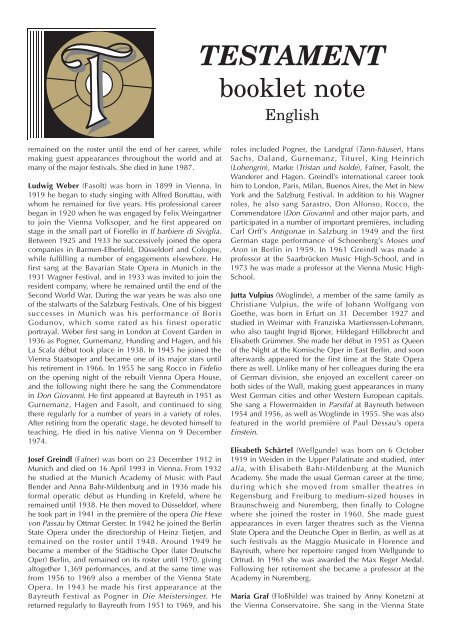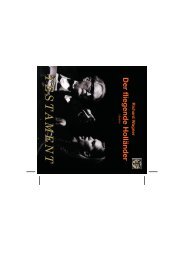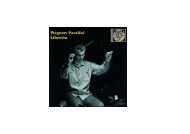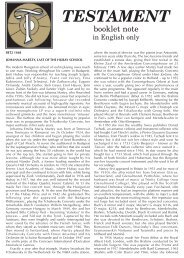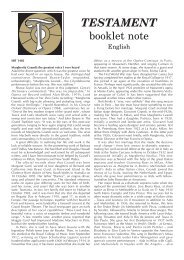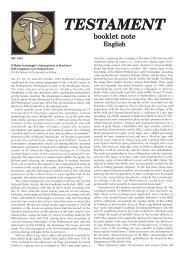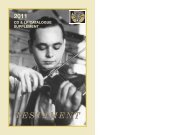Create successful ePaper yourself
Turn your PDF publications into a flip-book with our unique Google optimized e-Paper software.
emained on the roster until the end of her career, while<br />
making guest appearances throughout the world and at<br />
many of the major festivals. She died in June 1987.<br />
Ludwig Weber (Fasolt) was born in 1899 in Vienna. In<br />
1919 he began to study singing with Alfred Boruttau, with<br />
whom he remained for five years. His professional career<br />
began in 1920 when he was engaged by Felix Weingartner<br />
to join the Vienna Volksoper, and he first appeared on<br />
stage in the small part of Fiorello in Il barbiere di Siviglia.<br />
Between 1925 and 1933 he successively joined the opera<br />
companies in Barmen-Elberfeld, Düsseldorf and Cologne,<br />
while fulfilling a number of engagements elsewhere. He<br />
first sang at the Bavarian State Opera in Munich in the<br />
1931 Wagner Festival, and in 1933 was invited to join the<br />
resident company, where he remained until the end of the<br />
Second World War. During the war years he was also one<br />
of the stalwarts of the Salzburg Festivals. One of his biggest<br />
successes in Munich was his performance of Boris<br />
Godunov, which some rated as his finest operatic<br />
portrayal. Weber first sang in London at Covent Garden in<br />
1936 as Pogner, Gurnemanz, Hunding and Hagen, and his<br />
La Scala début took place in 1938. In 1945 he joined the<br />
Vienna Staatsoper and became one of its major stars until<br />
his retirement in 1966. In 1955 he sang Rocco in Fidelio<br />
on the opening night of the rebuilt Vienna Opera House,<br />
and the following night there he sang the Commendatore<br />
in Don Giovanni. He first appeared at Bayreuth in 1951 as<br />
Gurnemanz, Hagen and Fasolt, and continued to sing<br />
there regularly for a number of years in a variety of roles.<br />
After retiring from the operatic stage, he devoted himself to<br />
teaching. He died in his native Vienna on 9 December<br />
1974.<br />
Josef Greindl (Fafner) was born on 23 December 1912 in<br />
Munich and died on 16 April 1993 in Vienna. From 1932<br />
he studied at the Munich Academy of Music with Paul<br />
Bender and Anna Bahr-Mildenburg and in 1936 made his<br />
formal operatic début as Hunding in Krefeld, where he<br />
remained until 1938. He then moved to Düsseldorf, where<br />
he took part in 1941 in the première of the opera Die Hexe<br />
von Passau by Ottmar Gerster. In 1942 he joined the Berlin<br />
State Opera under the directorship of Heinz Tietjen, and<br />
remained on the roster until 1948. Around 1949 he<br />
became a member of the Städtische Oper (later Deutsche<br />
Oper) Berlin, and remained on its roster until 1970, giving<br />
altogether 1,369 performances, and at the same time was<br />
from 1956 to 1969 also a member of the Vienna State<br />
Opera. In 1943 he made his first appearance at the<br />
Bayreuth Festival as Pogner in Die Meistersinger. He<br />
returned regularly to Bayreuth from 1951 to 1969, and his<br />
<strong>TESTAMENT</strong><br />
booklet note<br />
English<br />
roles included Pogner, the Landgraf (Tann-häuser), Hans<br />
Sachs, Daland, Gurnemanz, Titurel, King Heinrich<br />
(Lohengrin), Marke (Tristan und Isolde), Fafner, Fasolt, the<br />
Wanderer and Hagen. Greindl’s international career took<br />
him to London, Paris, Milan, Buenos Aires, the Met in New<br />
York and the Salzburg Festival. In addition to his Wagner<br />
roles, he also sang Sarastro, Don Alfonso, Rocco, the<br />
Commendatore (Don Giovanni) and other major parts, and<br />
participated in a number of important premières, including<br />
Carl Orff’s Antigonae in Salzburg in 1949 and the first<br />
German stage performance of Schoenberg’s Moses und<br />
Aron in Berlin in 1959. In 1961 Greindl was made a<br />
professor at the Saarbrücken Music High-School, and in<br />
1973 he was made a professor at the Vienna Music High-<br />
School.<br />
Jutta Vulpius (Woglinde), a member of the same family as<br />
Christiane Vulpius, the wife of Johann Wolfgang von<br />
Goethe, was born in Erfurt on 31 December 1927 and<br />
studied in Weimar with Franziska Martienssen-Lohmann,<br />
who also taught Ingrid Bjoner, Hildegard Hillebrecht and<br />
Elisabeth Grümmer. She made her début in 1951 as Queen<br />
of the Night at the Komische Oper in East Berlin, and soon<br />
afterwards appeared for the first time at the State Opera<br />
there as well. Unlike many of her colleagues during the era<br />
of German division, she enjoyed an excellent career on<br />
both sides of the Wall, making guest appearances in many<br />
West German cities and other Western European capitals.<br />
She sang a Flowermaiden in Parsifal at Bayreuth between<br />
1954 and 1956, as well as Woglinde in 1955. She was also<br />
featured in the world première of Paul Dessau’s opera<br />
Einstein.<br />
Elisabeth Schärtel (Wellgunde) was born on 6 October<br />
1919 in Weiden in the Upper Palatinate and studied, inter<br />
alia, with Elisabeth Bahr-Mildenburg at the Munich<br />
Academy. She made the usual German career at the time,<br />
during which she moved from smaller theatres in<br />
Regensburg and Freiburg to medium-sized houses in<br />
Braunschweig and Nuremberg, then finally to Cologne<br />
where she joined the roster in 1960. She made guest<br />
appearances in even larger theatres such as the Vienna<br />
State Opera and the Deutsche Oper in Berlin, as well as at<br />
such festivals as the Maggio Musicale in Florence and<br />
Bayreuth, where her repertoire ranged from Wellgunde to<br />
Ortrud. In 1961 she was awarded the Max Reger Medal.<br />
Following her retirement she became a professor at the<br />
Academy in Nuremberg.<br />
Maria Graf (Floßhilde) was trained by Anny Konetzni at<br />
the Vienna Conservatoire. She sang in the Vienna State


